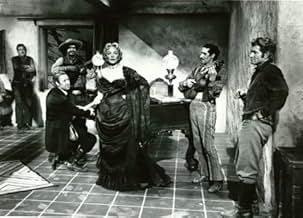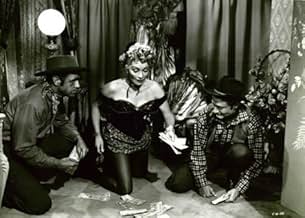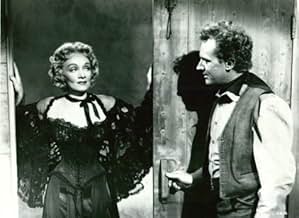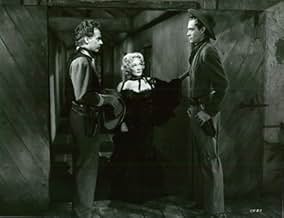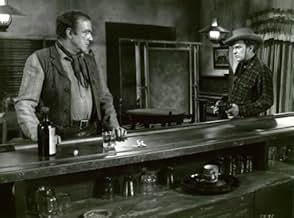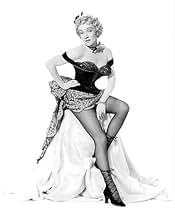IMDb-BEWERTUNG
6,8/10
5939
IHRE BEWERTUNG
Füge eine Handlung in deiner Sprache hinzuAfter the murder of his fiancée, a Wyoming ranch hand sets out to find her killer.After the murder of his fiancée, a Wyoming ranch hand sets out to find her killer.After the murder of his fiancée, a Wyoming ranch hand sets out to find her killer.
- Regie
- Drehbuch
- Hauptbesetzung
Rodd Redwing
- Rio
- (as Rodric Redwing)
Victor Adamson
- Racer with Fat Girl
- (Nicht genannt)
Roger Anderson
- Red
- (Nicht genannt)
Al Bain
- Race Spectator
- (Nicht genannt)
Ray Beltram
- Barfly
- (Nicht genannt)
Empfohlene Bewertungen
I'm not a Marlene Dietrich fan and don't really see Arthur Kennedy as being charismatic enough to interest her, and am not usually keen on background ballads, but I enjoyed this film from beginning to end.
Director Fritz Lang keeps the pace lively and brightens up the generally sombre mood with a couple of light-hearted sequences - first the "horse-race" with saloon girls riding cowboys and then the crooked politicians awaiting their fate in gaol.
"Variety" Film Guide calls the plot "corny", but it's no more so than many other films of the 1950s, or indeed of any other decade, and it's different to most Westerns of the period. And for those times it's also relatively direct in its treatment of sex; we are left in no doubt that Kennedy's fiancée has been raped and that the man Kennedy suspects of the assault is obviously out for what he can get from women.
One is not told how Kennedy acquires his gun-fighting skills - at the beginning a posse member points out his lack of these. The only weakness are a couple of "outdoor" scenes obviously filmed in the studio, where the rock formations are eye-catchingly unrealistic.
The acting is generally good, with Kennedy doing well as the grief- stricken hero seeking revenge and Mel Ferrer showing screen-presence as the slightly sinister and somewhat sensitive fast gun.
Director Fritz Lang keeps the pace lively and brightens up the generally sombre mood with a couple of light-hearted sequences - first the "horse-race" with saloon girls riding cowboys and then the crooked politicians awaiting their fate in gaol.
"Variety" Film Guide calls the plot "corny", but it's no more so than many other films of the 1950s, or indeed of any other decade, and it's different to most Westerns of the period. And for those times it's also relatively direct in its treatment of sex; we are left in no doubt that Kennedy's fiancée has been raped and that the man Kennedy suspects of the assault is obviously out for what he can get from women.
One is not told how Kennedy acquires his gun-fighting skills - at the beginning a posse member points out his lack of these. The only weakness are a couple of "outdoor" scenes obviously filmed in the studio, where the rock formations are eye-catchingly unrealistic.
The acting is generally good, with Kennedy doing well as the grief- stricken hero seeking revenge and Mel Ferrer showing screen-presence as the slightly sinister and somewhat sensitive fast gun.
With it being directed by the great Fritz Lang (a director with a great and distinctively Expressionistic visual and directing style, with 'M' and 'Metropolis' being two of the finest examples) and starring Marlene Dietrich (especially fond of her work with Josef von Sternberg and in 'Witness for the Prosecution'), 'Rancho Notorious' had a lot of interest value. Likewise with the story idea.
'Rancho Notorious' may not be my idea of a great film, especially for one with such a great director and an actress as talented as Dietrich. This is not to say that 'Rancho Notorious' is bad. It is far from that. While it is problematic and far from being one of Lang's best, in a way it's somewhat of a lesser effort, to me it was quite good and an interesting take on the genre. Strange and over-the-top but on the most part it's not in a bad way.
Its weak point is the main theme/song. It is used far too much, like over-explanatory narration in song form, and the actual theme is grating and heavy-handed. Didn't even think it fitted much stylistically either (sounding too jaunty for a film that started off in a gritty fashion) and the cheesiness of some of the words added to the out of kilter feel. Seeing as it features heavily, it was a big problem and made me not think highly of the music much.
The film is cheap-looking in the sets, which never look authentic and more hastily-made studio-bound settings that look like they were constructed on the remainder of a budget where most of it was blown hiring Lang and Dietrich. Arthur Kennedy's performance is slightly uneven, mostly he's fine but in the more romantic parts he looks uncomfortable and more chemistry (though it's there) with Dietrich would have been welcome.
Dietrich however, even when past prime, looks luminous and brings the right amount of charisma and toughness. Something that Kennedy also displays in his best moments. A relatively cast against type Mel Ferrer is lively support and George Reeves and Jack Elam are just as solid. Lang himself fares very well here, his direction is stylish and moody with some nice creative touches.
Also found 'Rancho Notorious' to boast some ravishingly striking cinematography. The rest of the songs are nicely sung and are placed and used better, even if one questions the necessity. The film gets off to a wonderfully gritty start that one does wish was carried further, though the over-the-top-ness was actually entertaining still and didn't jar as much as it sounds. The tension simmers beautifully and the climax scintillates, the lack of sentimentality was appreciated.
Summing up, intriguing, for Lang completests and to see how a different take on a Western can fare, and well done though Lang did much better. 7/10 Bethany Cox
'Rancho Notorious' may not be my idea of a great film, especially for one with such a great director and an actress as talented as Dietrich. This is not to say that 'Rancho Notorious' is bad. It is far from that. While it is problematic and far from being one of Lang's best, in a way it's somewhat of a lesser effort, to me it was quite good and an interesting take on the genre. Strange and over-the-top but on the most part it's not in a bad way.
Its weak point is the main theme/song. It is used far too much, like over-explanatory narration in song form, and the actual theme is grating and heavy-handed. Didn't even think it fitted much stylistically either (sounding too jaunty for a film that started off in a gritty fashion) and the cheesiness of some of the words added to the out of kilter feel. Seeing as it features heavily, it was a big problem and made me not think highly of the music much.
The film is cheap-looking in the sets, which never look authentic and more hastily-made studio-bound settings that look like they were constructed on the remainder of a budget where most of it was blown hiring Lang and Dietrich. Arthur Kennedy's performance is slightly uneven, mostly he's fine but in the more romantic parts he looks uncomfortable and more chemistry (though it's there) with Dietrich would have been welcome.
Dietrich however, even when past prime, looks luminous and brings the right amount of charisma and toughness. Something that Kennedy also displays in his best moments. A relatively cast against type Mel Ferrer is lively support and George Reeves and Jack Elam are just as solid. Lang himself fares very well here, his direction is stylish and moody with some nice creative touches.
Also found 'Rancho Notorious' to boast some ravishingly striking cinematography. The rest of the songs are nicely sung and are placed and used better, even if one questions the necessity. The film gets off to a wonderfully gritty start that one does wish was carried further, though the over-the-top-ness was actually entertaining still and didn't jar as much as it sounds. The tension simmers beautifully and the climax scintillates, the lack of sentimentality was appreciated.
Summing up, intriguing, for Lang completests and to see how a different take on a Western can fare, and well done though Lang did much better. 7/10 Bethany Cox
"Rancho Notorious" is a beautifully atmospheric and suspenseful film. Best known for his expressionist black & white suspense thrillers, director Fritz Lang brings the same qualities to this Technicolor western.
Although she must have been in her fifties when the film was made, Dietrich looks absolutely gorgeous. She also seems to be having lots of fun with the part, in a sense reprising her character from "Destry Rides Again." It's never explained how this woman with the strange German accent ended up in the Wild West, and we don't really care. By the way, Dietrich's performance in these two films was the basis for Madeline Kahn's great parody in "Blazing Saddles."
The one thing that really stands out in my mind about this film is how effectively the suspense builds. The tension leading up to Vern's discovery of the killer's identity is almost unbearable, and Lang makes us wait until the film's last five minutes for the inevitable score-settling gunfight.
In a period of film history when westerns were a dime a dozen, this one really stands out as a true classic.
Although she must have been in her fifties when the film was made, Dietrich looks absolutely gorgeous. She also seems to be having lots of fun with the part, in a sense reprising her character from "Destry Rides Again." It's never explained how this woman with the strange German accent ended up in the Wild West, and we don't really care. By the way, Dietrich's performance in these two films was the basis for Madeline Kahn's great parody in "Blazing Saddles."
The one thing that really stands out in my mind about this film is how effectively the suspense builds. The tension leading up to Vern's discovery of the killer's identity is almost unbearable, and Lang makes us wait until the film's last five minutes for the inevitable score-settling gunfight.
In a period of film history when westerns were a dime a dozen, this one really stands out as a true classic.
I've heard RN called underrated and under appreciated and I can see why. It's not the best or perfect but it's different from most. The story is lean but heavy in undertones and gives it weight and moves along well.
The Western is so unique, so internalised, and so full of instantly-recognisable motifs, that many Westerns from the classic era take on the look and feel not of the western United States, but some surreal and separate country, as far removed from America as anywhere else. This was especially the case when the increasingly European production crews in Hollywood produced their skewed yet affectionate takes on this "most American of genres".
Rancho Notorious at first comes across as a "noir" Western, at least if one looks at the Sylvia Richards story and Daniel Taradash screenplay, but it's much more than that. Director Fritz Lang probably had much less to do with the screenplay than is sometimes claimed (he was never a particularly great writer, even in his native German), but he has a whole lot to do with the tone of the picture. Far from turning this into an anti-western, he makes use of sweeping landscapes, rough-looking saloons and typical cowboy business, the sort of thing some revisionist filmmakers eschewed, but they are all given that typical Lang look of zigzagging paths and stark diagonal lines. He also injects that stylised rhythmic feel that harks back to his silent pictures or the bizarre semi-musical gangster movie You and Me (1938). A montage of gritty faces underscores a few of the songs, while a mysterious puff of smoke drifts onto the screen as Marlene Dietrich decides whether or not to gamble the last of her money. The impression is of a Western full of exaggerated cliché, and yet totally remote from the cosy cowboy flick.
The second crucial figure in Rancho Notorious is the other German émigré, Fraulein Dietrich. Although Dietrich is not really known as a Western star, her only other appearance in the genre being Destry Rides Again in 1939, her character in Rancho Notorious seems to be a play upon her old screen persona. It seems to chime particularly true with her real career trajectory that everyone remembers Altar Keane's name, a few have some sordid stories about her, but no-one seems to know quite what has happened to her now. Dietrich plays the part sublimely, conjuring up some of her old magic, tinged with the weariness of middle-age. Her best moments are in the series of flashbacks in which her character is introduced – her gleeful cheating in the "horse" race scene, or the disdainfulness with which she brushes off a would-be admirer in the gambling joint. She has the air of someone who has been round the block a bit, and yet makes it eminently clear why men still love her and fight over her. The very worthy Arthur Kennedy is ostensibly the lead player, although it is appropriate he is billed below Dietrich not just because she was a bigger star, but because she really is the heart of this movie.
Rancho Notorious is rather a cheap and cheerful offering, with the all the production values of the trashy B-Westerns that this era was full of. And yet it has something that even some of the most prestigious and professional pictures do not. Everyone involved seems to have been working on the same wavelength. There is the stripped-down production design of Wiard Ihnen and washed out Hal Mohr cinematography, which help to give it this bleak, distant imagery. Then there's the casting in smaller roles, stereotypically Western yet almost comically over-the-top, like the coroner who pronounces a man "reeeaal dead", or the moustachioed old-timer who imagines the ranch as some sort of romantic hideaway. And finally those haunting and twisted takes on the cowboy ballads penned by Ken Darby. Together they create a compelling view of the west, not as it really was, but as it has been imagined – in this instance, a dream of the Old West a few shades away from a nightmare.
Rancho Notorious at first comes across as a "noir" Western, at least if one looks at the Sylvia Richards story and Daniel Taradash screenplay, but it's much more than that. Director Fritz Lang probably had much less to do with the screenplay than is sometimes claimed (he was never a particularly great writer, even in his native German), but he has a whole lot to do with the tone of the picture. Far from turning this into an anti-western, he makes use of sweeping landscapes, rough-looking saloons and typical cowboy business, the sort of thing some revisionist filmmakers eschewed, but they are all given that typical Lang look of zigzagging paths and stark diagonal lines. He also injects that stylised rhythmic feel that harks back to his silent pictures or the bizarre semi-musical gangster movie You and Me (1938). A montage of gritty faces underscores a few of the songs, while a mysterious puff of smoke drifts onto the screen as Marlene Dietrich decides whether or not to gamble the last of her money. The impression is of a Western full of exaggerated cliché, and yet totally remote from the cosy cowboy flick.
The second crucial figure in Rancho Notorious is the other German émigré, Fraulein Dietrich. Although Dietrich is not really known as a Western star, her only other appearance in the genre being Destry Rides Again in 1939, her character in Rancho Notorious seems to be a play upon her old screen persona. It seems to chime particularly true with her real career trajectory that everyone remembers Altar Keane's name, a few have some sordid stories about her, but no-one seems to know quite what has happened to her now. Dietrich plays the part sublimely, conjuring up some of her old magic, tinged with the weariness of middle-age. Her best moments are in the series of flashbacks in which her character is introduced – her gleeful cheating in the "horse" race scene, or the disdainfulness with which she brushes off a would-be admirer in the gambling joint. She has the air of someone who has been round the block a bit, and yet makes it eminently clear why men still love her and fight over her. The very worthy Arthur Kennedy is ostensibly the lead player, although it is appropriate he is billed below Dietrich not just because she was a bigger star, but because she really is the heart of this movie.
Rancho Notorious is rather a cheap and cheerful offering, with the all the production values of the trashy B-Westerns that this era was full of. And yet it has something that even some of the most prestigious and professional pictures do not. Everyone involved seems to have been working on the same wavelength. There is the stripped-down production design of Wiard Ihnen and washed out Hal Mohr cinematography, which help to give it this bleak, distant imagery. Then there's the casting in smaller roles, stereotypically Western yet almost comically over-the-top, like the coroner who pronounces a man "reeeaal dead", or the moustachioed old-timer who imagines the ranch as some sort of romantic hideaway. And finally those haunting and twisted takes on the cowboy ballads penned by Ken Darby. Together they create a compelling view of the west, not as it really was, but as it has been imagined – in this instance, a dream of the Old West a few shades away from a nightmare.
Wusstest du schon
- WissenswertesCinematographer Hal Mohr, who had previously photographed Marlene Dietrich in Der große Bluff (1939), attempted to resign from the film because of 50-year-old Dietrich's insistence that he use lighting to make her look much younger than she actually was, and Mohr didn't think it was possible.
- PatzerWhen Haskell and Fairmont are in the cell and talking about gambling, one of them refers to a Chuck-a-Luck "Wheel". There is no wheel in Chuck-a-Luck. Chuck-a-Luck is a dice game played with (two or) three dice often contained in an hour-glass shaped rotatable cage. Bets are placed as to what number will come up on gaming table. The game played in the film involves a wheel with pegs in between representations of all the possible 3-dice rolls, which is the wheel that is both talked and sung about. This is a variation on the original game called Big Six Wheel. Because of the distribution of the combinations, the house advantage or edge for this wheel is greater than for Chuck-a-Luck.
- Zitate
Altar Keane: [to Vern] I'd wish you go away... and come back ten years ago.
- Crazy CreditsAs the title song plays and Bill Lee sings the lyric "... and a man of steel ..." there are eleven names of supporting actors on screen, and the name in the central position is George Reeves, soon to be cast as The Man of Steel in *The Adventures of Superman* (1952-58).
- VerbindungenEdited into Geschichte(n) des Kinos: Fatale beauté (1994)
Top-Auswahl
Melde dich zum Bewerten an und greife auf die Watchlist für personalisierte Empfehlungen zu.
- How long is Rancho Notorious?Powered by Alexa
Details
- Erscheinungsdatum
- Herkunftsland
- Sprache
- Auch bekannt als
- El refugio
- Drehorte
- Produktionsfirma
- Weitere beteiligte Unternehmen bei IMDbPro anzeigen
Box Office
- Budget
- 900.000 $ (geschätzt)
- Weltweiter Bruttoertrag
- 63 $
- Laufzeit
- 1 Std. 29 Min.(89 min)
- Farbe
- Seitenverhältnis
- 1.37 : 1
Zu dieser Seite beitragen
Bearbeitung vorschlagen oder fehlenden Inhalt hinzufügen

